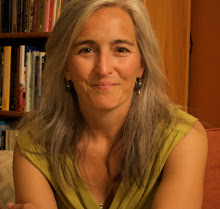Wednesday, April 21, 2010
Tribute to the birth of a Welsh poet
From the third story bay of an abandoned
250 year old woolen mill,
I stared across rolling pastures along Felinfach Road.
It was, quite certainly,
the most marvelous sight I had ever beheld:
the narrow lane disappeared round a corner,
while perfectly tended hedgerows
loosely held back wildness and the fertility of
rambling dreams.
Never had I seen so many shades of green.
Never had I felt transported
simply by drawing breath,
and never, ever, had my heart been all-at-once
unfettered
and calm.
At ease for the first
time in life, I experienced vast
Silence wrapping around my small body
(a dark, rich, purple tapestry
very like those that had once rhythmically
unfolded off the dusty looms two floors below me)
and I was alone.
I might have been afraid,
as each fiber of my soul expanded.
I might have leaned back
against the safe smooth timber beams,
and closed my eyes against the spinning prayers of hawk in flight
toward Aberystwyth.
I might have fled, yet
my ancestors convened.
“Bare witness,” said my Grannie
as she reached her soft gnarled hand toward mine, and gathered
me into the circle. “It’s time.”
Then, looking into my eyes, the old ones began to whisper.
They told stories of warrior’s hearts, uncommon loyalty and
the glorious rise of the great Bear.
They recited poems of faith held fast
through long hushed winters, as well as
ballads of the Beltane Queen and passions’ sweet adventures.
Laughing, the men bellowed songs about harvest fires
while the women,
skirts swinging and checks flushed,
made the floorboards tremble with their breathless dancing.
Smells of wool and
wood, sweat on sun-browned shoulders,
fermenting ale, sweet cream and
raw sugar, and the smoke of
tobacco kissed by fire
swirled like incense all around.
Joy raised the rafters, and translucent memories,
like particles of dust in sunlight, filled the old building
and showered everything within.
Finally, embraced as a child
who has arrived at last on home’s doorstep,
they marked my eyes
with rich dark coal, and baptized me in the name of
Mystical Grace and Love.
Then, Ceridwen nodded with a smile.
She guided me back to the lofty opening and pointed across the shire,
“Look there, daughter. This is your poem.
When you lose your way;
when you have forgotten who you are;
when the wildness has been tamed and the colors start to fade,
remember this day, and your heart will follow.”
She kissed me sweetly on the lips,
filled my lungs with her blessing and
left me there gazing
across the rolling pastures of Felinfach Road.
Quite certainly,
it was the most marvelous sight I had ever beheld.
Felinfach \ velin-vahk \ meaning “a small mill.”
Ab·er·yst·wyth \ˌa-bə-ˈris-ˌtwith, -ˈrəs-\ the geographical name of a Borough in W. Wales on Cardigan Bay
Ceridwen \ce-rid-wen, cer(i)-dwen\ is pronounced ke-RID-wen. It is of Welsh origin, and its meaning is "fair, blessed poetry". Celtic mythology: name of the goddess of poetic inspiration. Also supposedly the name of the mother of the legendary sixth-century Welsh hero Taliesin.
Subscribe to:
Post Comments (Atom)




No comments:
Post a Comment